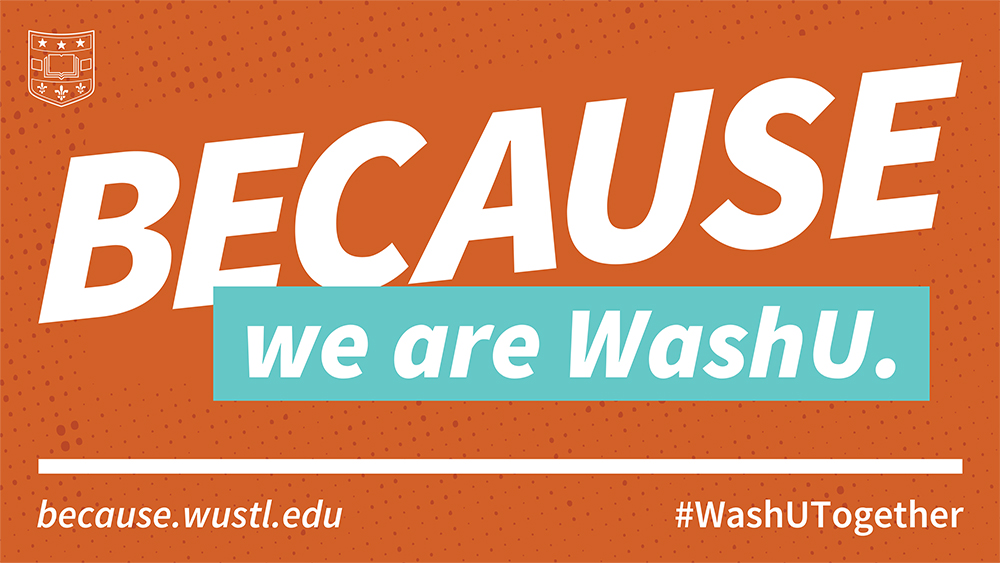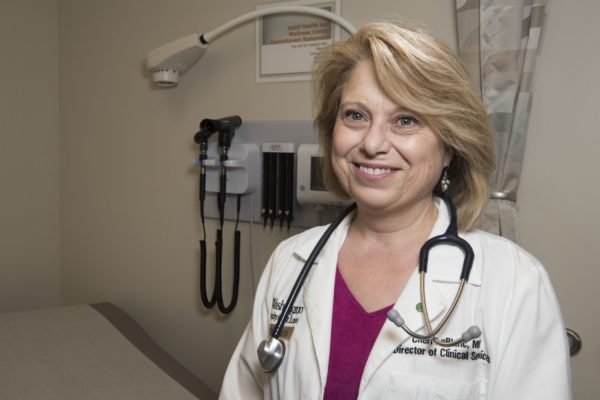With the start of the academic year, each and every member of the Washington University in St. Louis community who will be on campus this fall will be required to follow four steps – four public health measures that must be completed by students, faculty and staff individually, but will have an impact globally. They are:

- Wearing a mask.
- Physical distancing.
- Daily self-screening and monitoring for symptoms.
- Hand-washing and personal hygiene.
These behaviors are required because they will protect our community; because students, faculty and staff want to stay together; and, importantly, because the university’s own medical experts believe they will help prevent the spread of COVID-19 on campus.
“The No. 1 difference that has emerged since the spring is that we now have the data to know what works,” said Steven Lawrence, MD, associate professor of medicine at the School of Medicine and an infectious disease specialist.
“Even though these things are simple, we know it’s hard to keep doing them day in and day out,” said Cheri LeBlanc, MD, executive director of the Habif Health & Wellness Center on the Danforth Campus and an assistant professor of medicine at the School of Medicine. “As humans, we need to connect with one another. We need that personal contact. But this is so important.”
Here, LeBlanc and Lawrence go into more detail about the four healthy habits.
Wear face coverings
Wear a mask that fully covers your mouth and nose at all times while on campus, unless alone in an individual closed office space, or outside andable to maintain 6 feet of physical distance from anyone you may encounter.
“Universal masking works,” Lawrence said, citing a Centers for Disease Control & Prevention (CDC) study that arose from a hair salon in Springfield, Mo., — co-led by the School of Medicine’s M. Joshua Hendrix, MD — in which two stylists at a Missouri hair salon exposed 139 masked patrons and no one got sick. “Absolutely, unequivocally, do not be around people you don’t live with unless everyone is masked,” Lawrence said.
‘Never be within 6 feet of someone with whom you don’t live without a mask. If everyone did that, in and of itself, this pandemic would be under control.’
Steven Lawrence MD
LeBlanc said when choosing a mask, pay attention to the fit. “It should be snug over your nose, under your chin and behind your ears,” she said. “Too loose is not protecting you. There are different size masks on the market. Keep trying different ones until you find the best fit for you.”
And pay attention to the type of face covering. “Emerging evidence suggests that bandanas and gaiters used as face coverings may not be effective at preventing the spread of COVID and these should be avoided,” Lawrence said. “Face masks with valves allowing unfiltered air to be exhaled are also not effective.”
Other points about masks: Wash your hands before placing and removing your mask, wash your masks regularly, and store them in a clean area when not in use.
(See mask requirements for the Danforth Campus and Medical Campus).
Physical distancing
Maintain at least 6 feet of separation from other people at all times, and avoid or minimize in-person meetings and large group gatherings. That’s going to be a challenge for students who are used to congregating in common areas around campus, such as hall lounges, conference rooms and recreational areas. But every precaution is in place to keep contact at a minimum.
The challenge is going to be with the desire for social situations, which is hard for anyone, especially young adults for whom large gatherings are, frankly, part of college. Again, Lawrence stresses the importance of distance.
“Getting together is one issue, and then how close you are is another issue,” Lawrence said. “The simple solution: Do not be around people you don’t live with unless everybody’s masked.”
LeBlanc echoes that sentiment. “Even if someone is asymptomatic and unknowingly has COVID, if they are masked and you are masked and you are 6 feet apart – those kinds of interactions will be protected,” she said.
Complete self-screening
Self-screening and monitoring for symptoms will be important daily steps.
“While we know that many cases of COVID-19 can occur without any symptoms, those who do have symptoms are likely to be quite contagious, particularly right when the symptoms start,” Lawrence said. “So each day, all students, faculty and staff must complete and pass a health self-screening.”
The self-screening, which is available at screening.wustl.edu, is a quick check of symptoms and an affirmation that the self-test has been completed. A passing screening will result in a green checkmark on the screen, which can be shown on campus as needed to verify that a self-screening has been completed. If an individual does not pass the daily self-screening, they must not leave their residence hall room or come to campus, and must immediately contact Habif Health and Wellness Center at 314-935-6666 (students) or Occupational Health at 314-362-5056 (faculty and staff).
“It’s only going to take a minute or two, but it’s a reminder, every single day, that COVID-19 is here and it must be taken seriously,” LeBlanc said.
Personal hygiene and hand washing
Wash your hands often with soap and water for at least 20 seconds, especially after you have been in a public place or after blowing your nose, coughing or sneezing. If you are not in a place to wash with soap and water, then alcohol-based hand sanitizers can be used.
“Honestly, it’s not hard to get rid of the virus off your hands,” Lawrence said. “The key is when. Whenever you’re in a public space and touching surfaces, you want to first, wash your hands or use hand sanitizer before you’re in that space and afterward.
“Then really try to avoid touching your face during and afterward until you have washed your hands again,” he said.
“Wash for 20 seconds being sure to reach all areas of your hands, fingers, and nails,” LeBlanc said. “I find myself washing my hands more at home now, too. I’ll sing ‘Happy Birthday’ but whatever works for you is fine.”
The university will also implement a campuswide Integrated Disinfectant Plan based on recommendations from the CDC; the American College Health Association; and infectious disease experts at the School of Medicine. With new protocols in place, cleaning and sanitation activities will increase in frequency and scope for most areas.
More information on the public health requirements and the “Because” campaign can be found on the campus health and safety page on the WashUTogether: COVID-19 Response website.
“Never be within 6 feet of someone with whom you don’t live without a mask,” Lawrence said. “If everyone did that, in and of itself, this pandemic would be under control. We’d have cases, but we wouldn’t have high numbers, we wouldn’t have businesses shut down and we wouldn’t run the risk of schools not re-opening.”


Comments and respectful dialogue are encouraged, but content will be moderated. Please, no personal attacks, obscenity or profanity, selling of commercial products, or endorsements of political candidates or positions. We reserve the right to remove any inappropriate comments. We also cannot address individual medical concerns or provide medical advice in this forum.